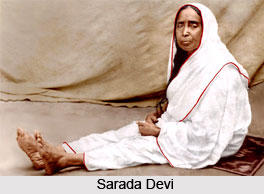 Sarada Devi also known as the Holy Mother was the wife of Sri Ramakrishna Paramahansa (1836-1886). She was his constant companion during the most eventful period of his life and a witness of his spiritual experiences. Sri Ramakrishna himself molded her life and assigned her place in the carrying out of his mission after his death.
Sarada Devi also known as the Holy Mother was the wife of Sri Ramakrishna Paramahansa (1836-1886). She was his constant companion during the most eventful period of his life and a witness of his spiritual experiences. Sri Ramakrishna himself molded her life and assigned her place in the carrying out of his mission after his death.
The Holy Mother lived as an average Hindu woman, devoting herself to the faithful discharge of her household duties. Inwardly she practiced total non-attachment and remained undisturbed by what happened in the physical world. Never did her mind deviate from contact with God. Thus she has become, today, a model for both householders and world-renouncing monks.
Sarada Devi did not write any books; her utterances and reminiscences have been recorded by her disciples like Swami Nikhilananda, Swami Tapasyananda. Though uneducated, Sarada Devi`s spiritual insight and utterances are highly regarded by scholars. Some of her sayings of Sarada Devi have been noted below:
* God is one`s very own. It is an eternal relationship.
* Ordinary human love results in misery. Love for God brings blessedness.
* One who makes a habit of prayer will easily overcome all difficulties.
* As wind removes the cloud, so the Name of God destroys the cloud of worldliness.
* My child, you have been extremely fortunate in getting this human birth. Have intense devotion to God. One must work hard. Can one achieve anything without effort? You must devote some time for prayer even in the midst of the busiest hours of the day.
* Do the Master`s work, and along with that practice spiritual disciplines too. Work helps one to keep off idle thoughts. If one is without work, such thoughts rush into one`s mind.
* One must perform work. It is only through work that the bondage of work will be cut asunder and one will acquire a spirit of non-attachment.
* One should always discriminate and strive hard for the realization of God.
* Even water, which has a natural tendency to flow downwards, is drawn up to the sky by the sun`s rays. In the same way, God`s grace lifts up the mind which has got a tendency to run after sense objects.
* Through spiritual disciplines the ties of past karma are cut asunder. But the realization of God cannot be achieved without ecstatic love for him.
* It is idle to expect that dangers and difficulties will not come. They are bound to come. But for a devotee they will pass away under the feet like water.
* Can you call a person who is devoid of compassion a human being? He is a veritable beast.
* If you want peace, do not find fault with others. Rather see your own faults. Learn to make the whole world your own. No one is a stranger, my child; the whole world is your own.
* When a man sees defects in others, his own mind first gets polluted. What does he gain by finding faults in others? He only hurts himself by that.
* All teachers are one. The same power of God works through them all.
* I am your true mother, a mother not by virtue of being your guru`s wife, nor by way of empty talk, but truly the mother.
* I am the mother of the virtuous as well as the wicked.
* If my son wallows in the dust or mud, it is I who has to wipe all the dirt and take him on my lap.
* My son, if a thorn pricks your foot; it hurts me like a spear entering my heart. Never fear and whenever you are in distress just say to yourself, "I have a mother"
* One should always be active. One should never be without work. For when one is idle, all sorts of bad thoughts crop up in one`s mind.









